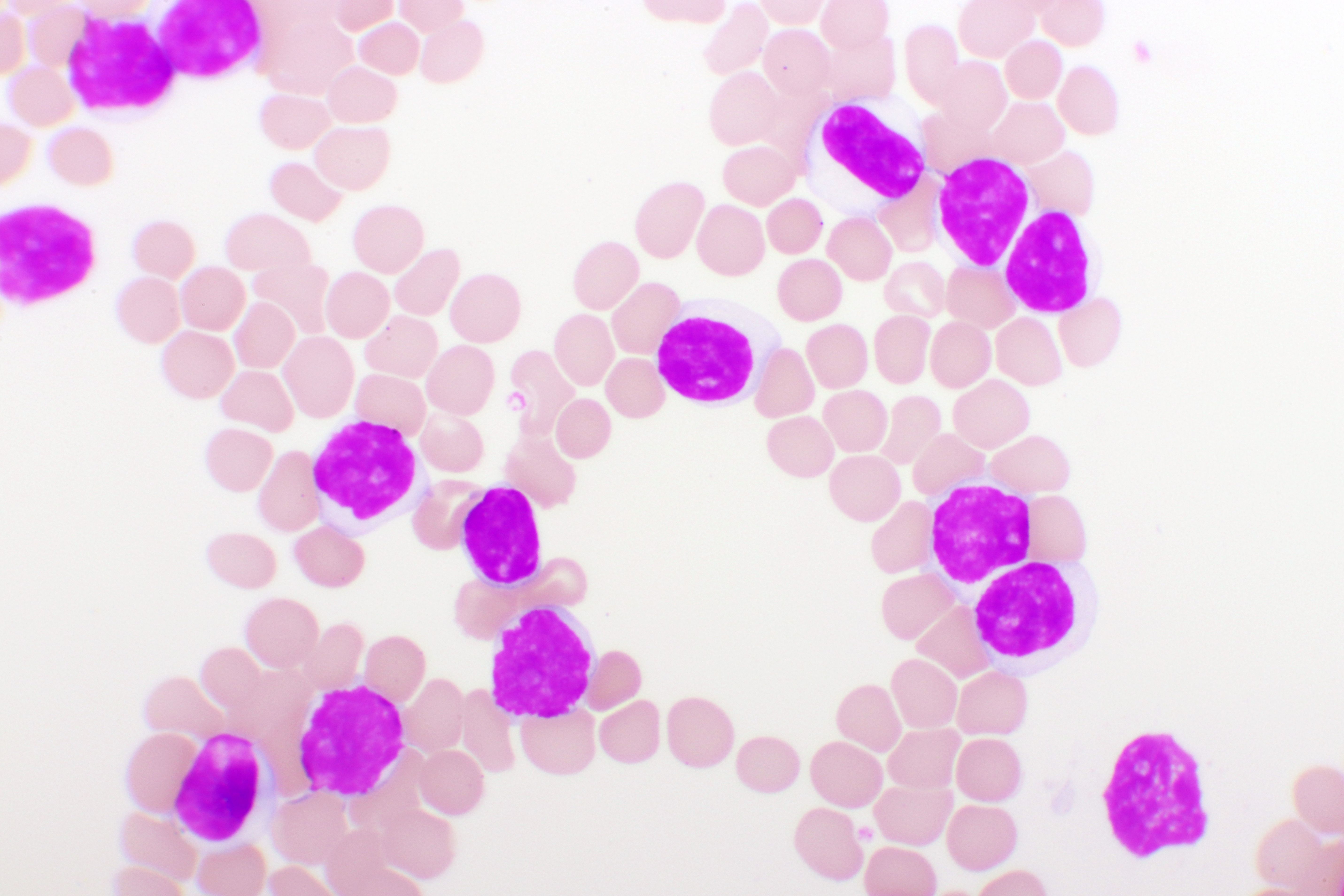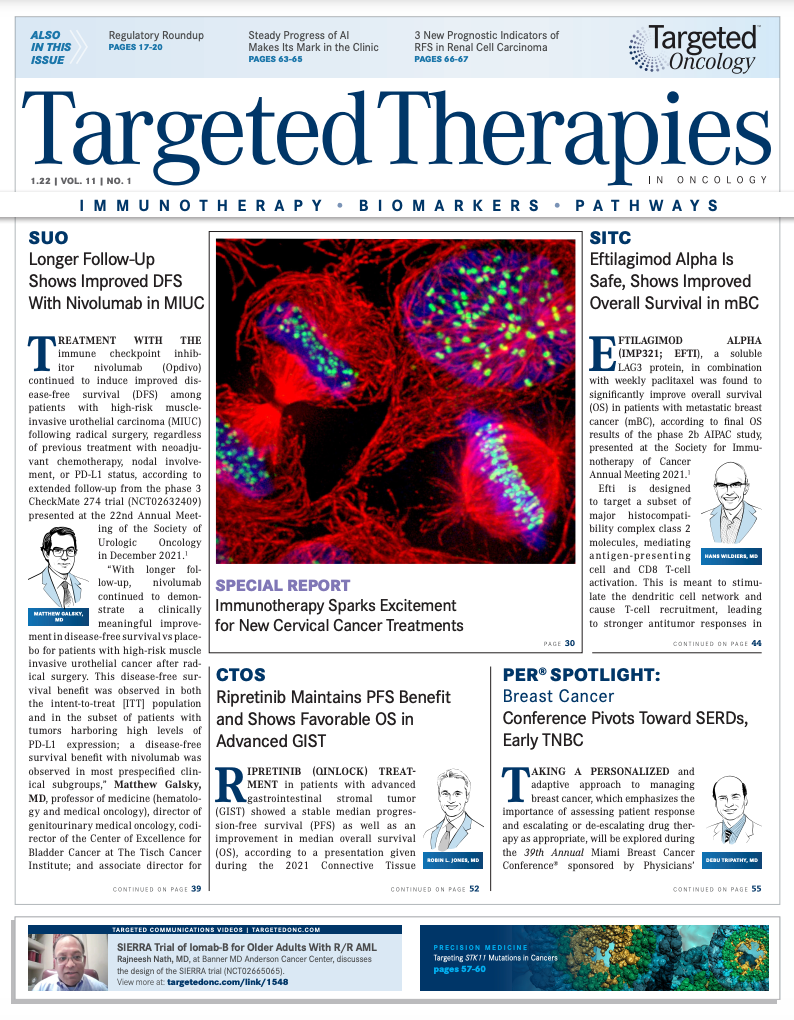Adding Ibrutinib Improves the Efficacy of Liso-Cel in R/R CLL
Chimeric antigen receptor T-cell therapies have demonstrated potential in chronic lymphocytic leukemia. However, T-cell dysfunction that is inherent to the disease, including reduced proliferative and cytotoxic capacities, limits the efficacy of this approach, according to an expert.

Concurrent treatment with ibrutinib (Imbruvica) in patients with relapsed/refractory chronic lymphocytic leukemia (CLL) who were receiving lisocabtagene maraleucel (liso-cel; Breyanzi) led to measurable effects in both chimeric antigen receptor–positive (CAR+) and endogenous T cells, both of which were linked with improved efficacy, according to translational analyses of the ongoing TRANSCEND CLL 004 study (NCT03331198) that were presented during the 2021 Society for Immunotherapy of Cancer (SITC) Annual Meeting.1
Data within a gene set enrichment analysis showed that there was positive enrichment of gene sets linked with cell proliferation, metabolism, and interferon response, as well as a negative enrichment of inflammationassociated gene sets. “These results suggest that ibrutinib may potentiate the efficacy of liso-cel therapy in patients with relapsed/ refractory CLL,” lead study author Jerill Thorpe, a senior scientist at Bristol Myers Squibb, said in a virtual presentation during the meeting.
CAR T-cell therapies have demonstrated potential in CLL. However, Thorpe noted that T-cell dysfunction that is inherent to CLL, including reduced proliferative and cytotoxic capacities, limits the efficacy of this approach. Preclinical data have shown that ibrutinib improves the function of liso-cel that is independent of its antitumor effects.2
The phase 1 TRANSCEND CLL 004 trial is evaluating the efficacy and safety of liso-cel monotherapy or with concurrent ibrutinib in patients with relapsed/refractory CLL. Most recently, in data presented at the International Workshop on CLL, the combination was associated with a manageable safety profile for patients with relapsed/refractory CLL or small lymphocytic lymphoma.3
At a median follow-up of 17 months, no grade 5 adverse events or grade 4/5 cytokine release syndrome (CRS) or neurological events were reported. Of the 23 evaluable patients, all-grade CRS events occurred in 18 patients (78%), with only 1 (4%) having grade 3 CRS. All-grade neurologic events were reported for 7 patients (30%), and 4 of these (17%) had grade 3 events. Eleven of these patients (48%) required tocilizumab (Actemra) and/or corticosteroids.
Efficacy findings showed that the overall response rate was 95%, which included a 59% complete response (CR) rate and a 36% partial response (PR) rate. Moreover, patients who received liso-cel at 100 × 106 CAR T cells had a more pronounced CR (61%) and a 29% PR rate, compared with 50% and 25%, respectively, for those who received 50×106 CAR T cells.
At the 2021 SITC Annual Meeting, investigators presented the data from translational analyses from those who received liso-cel alone (n=16) or plus ibrutinib (n=19) from the trial. Liso-cel pharmacokinetics were assessed via flow cytometry.
Further data showed that gene set enrichment analyses through hallmark gene sets demonstrated that CAR+ and endogenous T cells had similar expression profiles in response to ibrutinib in patients on this study. Data showed that at peak CAR+ T-cell expansion, increased expression of pathways were associated with T-cell proliferation and metabolism as well as decreased expression of pathways linked with inflammatory signaling. Additionally, Thorpe noted that treatment with ibrutinib led to increased liso-cel expansion and reduced serum IL-6.
An independently derived CLL ibrutinibresponse gene signature score was increased and sustained over time in CAR+ and endogenous T cells following the liso-cel/ibrutinib combination, but this was not the case with liso-cel alone. Also, a higher ibrutinib gene signature score in CAR+ T cells at time to maximum concentration was linked with increased probability of undetectable minimal residual disease in the bone marrow and in the peripheral blood regardless of treatment arm. When the ibrutinib score was higher in endogenous T cells at 2 months, posttreatment was linked with longer progression-free survival (PFS) (P =.0012).
Additional findings showed that a T-cell exhaustion gene signature was significantly reduced and associated with improved PFS with both liso-cel alone and in combination with ibrutinib. However, Thorpe cautioned that the small sample size of the analysis should be taken into consideration when interpreting the ibrutinib gene expression score and T-cell exhaustion–related gene signature data. “Work is under way to extend this analysis to a larger cohort,” Thorpe said. Also, a lower CAR+ T-cell exhaustion score after 1 month of treatment (≤0.8 vs >0.8) was linked with a longer PFS (P =.01).
REFERENCES
1. Thorpe J, Rytlewski JA, Gillenwater HH, et al. Concurrent ibrutinib enhances T cell function in patients with chronic lymphocytic leukemia (CLL) treated with lisocabtagene maraleucel (liso-cel), a chimeric antigen receptor (CAR) T cell therapy. Presented at: 2021 Society for Immunotherapy of Cancer Annual Meeting; November 10-14, 2021; Washington, DC.
2. Qin JS, Johnstone TG, Baturevych A, et al. Antitumor potency of an anti-CD19 chimeric antigen receptor t-cell therapy, lisocabtagene maraleucel in combination with ibrutinib or acalabrutinib. J Immunother. 2020;43(4):107-120. doi:10.1097/CJI.0000000000000307 3. Wierda WG, Dorritie KA, Munoz J, et al. Transcend CLL 004: phase 1 cohort of lisocabtagene maraleucel (liso-cel) in combination with ibrutinib for patients with relapsed/refractory CLL/SLL. Presented at: 2021 International Workshop on Chronic Lymphocytic Leukemia; September 17-20, 2021; virtual.

Survivorship Care Promotes Evidence-Based Approaches for Quality of Life and Beyond
March 21st 2025Frank J. Penedo, PhD, explains the challenges of survivorship care for patients with cancer and how he implements programs to support patients’ emotional, physical, and practical needs.
Read More